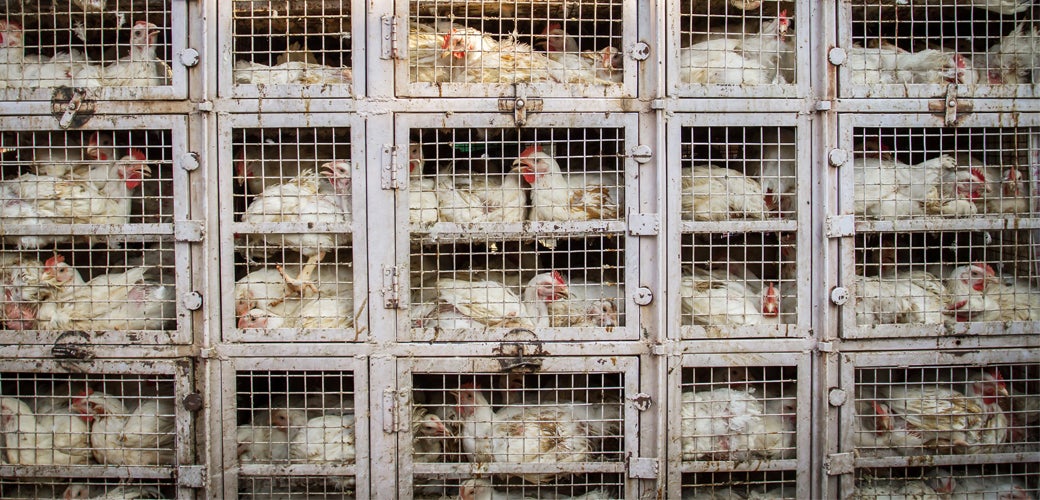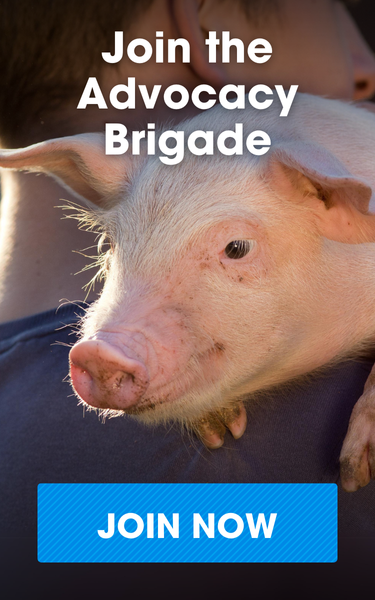
Matt’s Blog: Dangerously Fast Slaughter Speeds Are Putting Animals and People at Greater Risk During COVID-19 Crisis

While many industries are prioritizing safety and compassion in their pandemic responses, American meat processing and slaughter facilities are going in the opposite direction at a grave cost to workers, consumers and animals.
Last week the public responded with rightful horror to a new lawsuit alleging that Tyson not only failed to provide PPE for employees working long hours in cramped slaughterhouses, but that supervisors also placed bets on how many workers would contract the deadly disease. It is this culture of disregard for people’s lives that has led to more than 49,000 slaughter plant workers testing positive for the virus since April, and at least 249 workers’ and five inspectors’ deaths.
The alarming spread of COVID-19 among slaughterhouse employees has exposed massive vulnerabilities in our food system, especially when it comes to the speed of production at these facilities. Rather than suspend line speed increases to better accommodate social distancing, since the start of the pandemic, the U.S. Department of Agriculture (USDA) has allowed a record number of slaughter plants to significantly increase line speeds from a maximum of 140 birds per minute to an astounding 175 birds per minute (three birds slaughtered every second).
An analysis from the National Employment Law Project found that all 15 chicken plants allowed by the USDA to operate at faster line speeds in April 2020 had a record of severe injuries, were cited for worker safety violations by the federal Occupational Safety and Health Administration and/or were sites of recent COVID-19 outbreaks.
Higher-speed slaughter systems also put consumers at risk because they pressure workers and inspectors to slaughter animals quickly, which can jeopardize food safety. National watchdog Food and Water Watch has established a correlation between higher line speeds and greater occurrences of certain food safety-related regulatory violations.
Just as objectionable as the impact on humans is the impact on animals. Faster line speeds make it more challenging for plants to observe humane handling laws and regulations, putting already frightened and vulnerable animals at greater risk of rough and abusive handling, more frequent use of painful electric prods, and botched stunning—which can result in animals being dismembered and slaughtered while conscious.
The Safe Line Speeds in COVID-19 Act (H.R. 7521/S. 4338)—introduced by Reps. Marcia Fudge (D-OH), Rosa DeLauro (D-CT), and Bennie Thompson (D-MS) in the House, and by Senator Cory Booker (D-NJ) in the Senate—would address these alarming issues by revoking any line speed increase approvals issued to slaughter plants and suspending line speed increases during the COVID-19 crisis. It would also require the Government Accountability Office to conduct a post-pandemic review of whether the federal COVID-19 response was effective in ensuring animal, food, and worker safety in the meatpacking industry. The bill is supported by a diverse coalition of animal welfare, consumer safety, and workers’ rights organizations.
According to a new public opinion survey [PDF] conducted by Lake Research Partners, the vast majority (89%) of Americans are concerned about industrial animal agriculture, citing animal welfare, worker safety, or public health risks. Stories about the industry’s failure to protect animals and workers have elevated concerns and driven high levels of bipartisan support for reforms to the industry. Eighty-two percent of all survey respondents—and 97% of farmers and their families, who have first-hand experience—now believe the government should mandate slower slaughter speeds to protect animals, workers, or food safety.
We can all agree that supporting food production during the pandemic is a top priority but that should not be used as justification for putting animals or humans at unnecessary and unacceptable risk. For the sake of workers, consumers, and animals, we urge Congress to enact the Safe Line Speeds in COVID-19 Act.
Originally published in The Hill

